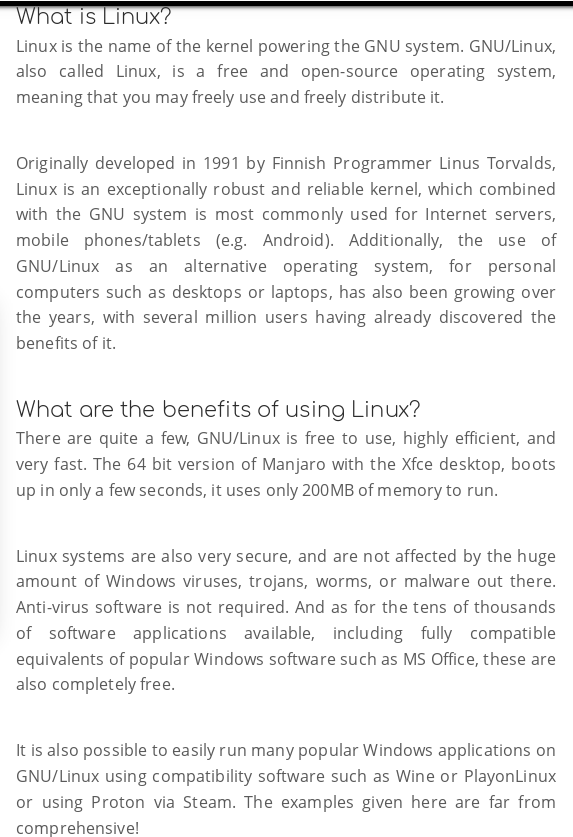This same topic appeared earlier in Reddit but was not much addressed. Why the removal of this section? It was a very clarifying thing for new users to Linux who are confused: “i was talked about Linux this and Linux that, and now here all that appears is this ‘Manjaro’ - i thought this was that Linux”.
So, there was a Linux section on the main Manjaro dot org website before explaining what the actual Linux is and bit of its history. It is not there any longer after the website update. Was it forgotten to put back there?
I think it would be good and informative to be in place, especially for a confused new user as described earlier. (because of this it gets thinkin should distros utilize the word “Linux” more straight in the name; Manjaro Linux / Fedora Linux (it actually officially is just that but not used always), Linux Mint… So indicating the unifying element: Linux the kernel. Ubuntu Linux would be the most effective, as its so popular and the first “Linux” for so many. Sometimes they used it but usually its just “Ubuntu”. I hope you get what i’m after here.
On the Manjaro Linux website there is now only “Linux Software” tab, but not the one, that would indeed be very informative to new comers, who have just heard about “Linux” and ended up on Manjaro’s website but indeed are in confusion: “what Manjaro? What Fedora? What Ubuntu? Wasn’t this supposed to be Linux?”.
The section i mean here and is now absent from the website:
"What is Linux?
Linux is the name of the kernel powering the GNU system. GNU/Linux, also called Linux, is a free and open-source operating system, meaning that you may freely use and freely distribute it.
Originally developed in 1991 by Finnish Programmer Linus Torvalds, Linux is an exceptionally robust and reliable kernel, which combined with the GNU system is most commonly used for Internet servers, mobile phones/tablets (e.g. Android). Additionally, the use of GNU/Linux as an alternative operating system, for personal computers such as desktops or laptops, has also been growing over the years, with several million users having already discovered the benefits of it. What are the benefits of using Linux?
There are quite a few, GNU/Linux is free to use, highly efficient, and very fast. The 64 bit version of Manjaro with the Xfce desktop, boots up in only a few seconds, it uses only 200MB of memory to run.
Linux systems are also very secure, and are not affected by the huge amount of Windows viruses, trojans, worms, or malware out there. Anti-virus software is not required. And as for the tens of thousands of software applications available, including fully compatible equivalents of popular Windows software such as MS Office, these are also completely free.
It is also possible to easily run many popular Windows applications on GNU/Linux using compatibility software such as Wine or PlayonLinux or using Proton via Steam. The examples given here are far from comprehensive!
I think confusion of a new user lessens, as the one unifying thing, “Linux” is there well explained on the get go. The latter info text could still show upon hovering with mouse to that “What is Linux” section or upon clicking it. Like a drop down, or so ![]()
Why was this “What is Linux” -section removed at all? I hope this post is not too confusing and i hope my meaning comes through. Thanks for any answers again.
Edit: i put that original “What is Linux” there as a .png attachment.
Moderator edit: Fixed formatting
